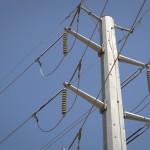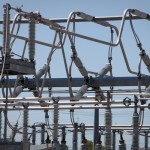Utilities Across Texas Warn of Scams

Photo by JOEL SAGET/AFP/Getty Images
Utility scams are a common form of fraud and identity theft.
Sometimes it’s a knock on the door, with someone telling you they need to check your electrical wiring. Perhaps you’ve gotten a phone call threatening to cut off your power if you don’t pay your electric bill immediately over the phone by credit card or within a half hour by wire transfer. Or maybe it’s someone on the phone calling to offer to help you pay your electric bill, thanks to a federal program. Most likely all of these are instances of fraud — criminals attempting to extort you or steal your identity.
“Scams are constantly being generated, not just utility scams,” says Jarrod Wise with the Better Business Bureau‘s Austin office. “Scammers will find any kind of way to try to get your personal information,” he says, with the intention of stealing your identity.
Sometimes the scams will use intimidation and fear to defraud consumers, like threatening to cut off your power. Wise says this is a “red flag.” “I mean, you have to say, no one [from a power company] is going to demand to do this right away, no one is going to demand money up front, and your power isn’t going to be turned off. That’s just not going to happen.”
Utilities fraud accounts for some ten percent of reported identity theft in the country, according to the most recent numbers from the Federal Trade Commission. And Texas has the third-highest number of fraud complaints in the nation, according to the FTC. Over $77 million was taken from consumers fraudulently in Texas in 2012. In the summer months, Wise says, utility scams tend to become more common in Texas, as electricity use (and power bills along with it) rises.
Wise says many of these scams tend to prey on the elderly, because they can be “more trusting.” And they’re not limited to phone calls and door-to-door haranguing. “Of course there’s email, text messaging, bluetooth,” Wise says. “These scammers will do anything they can to get your information and your money.”
How can you protect yourself against such scams? Here’s three pieces of advice from the state Attorney General’s office:
- “Never provide Social Security numbers, credit card numbers or bank account information to anyone who requests it during an unsolicited phone call or in-home visit.”
- “If someone calls claiming to represent the local utility company and demands immediate payment or personal information, call recipients should hang up the phone and call the customer service number on their utility bill. Texans should never give in to high pressure calls seeking personal information.”
- “Texans should never allow anyone into their homes to check electrical wiring, natural gas pipes or appliances unless an appointment has been scheduled or a utility problem has been reported. Anytime a utility employee arrives at a residence, the occupant should require that the employee produce proper identification.”

